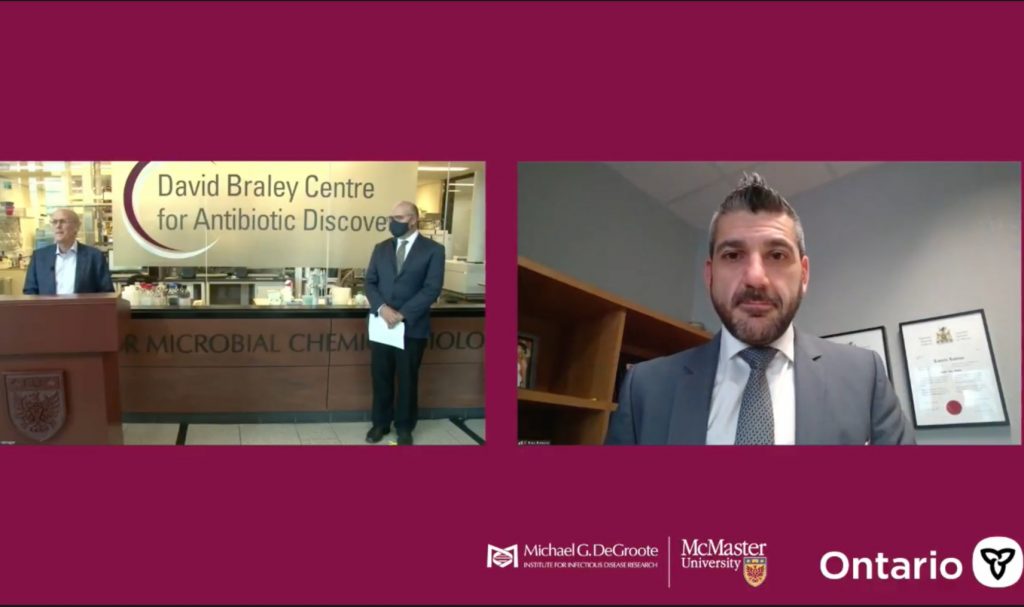Ontario invests $1 million in McMaster researchers’ effort to prevent the next pandemic

Ontario’s Minister of Colleges and Universities Ross Romano, right, announced today that the province is investing $1 million to create a nationally accessible library of compounds that will accelerate the work of McMaster’s Global Nexus for Pandemics and Biological Threats. He is seen here announcing the investment by video conference with McMaster President David Farrar and infectious disease expert Gerry Wright.
BY Wade Hemsworth
October 7, 2020
Ontario’s Minister of Colleges and Universities Ross Romano has announced that the province is investing $1 million to create a nationally accessible library of compounds that will accelerate the work of McMaster’s Global Nexus for Pandemics and Biological Threats.
In keeping with pandemic social-distancing protocols, the minister made the announcement electronically from Toronto, in co-ordination with McMaster president David Farrar and the one of the university’s leading infectious-disease researchers, Gerry Wright, who joined Romano online from campus.
The investment will create the Canadian Chemical Compound Library for Antibiotic Discovery at McMaster University – which will expand McMaster’s existing collection of more than 10,000 strains of environmental bacteria and fungi and make it available to researchers across the country. The David Braley Centre for Antibiotic Discovery will be home to the library.
New antibiotic drugs come from searching large and diverse collections of chemicals for those with potential to kill life-threatening bacteria. The new compound library will close a critical gap by creating wider scientific access to a quality chemical collection explicitly designed for antibiotic discovery.
The investment will also support the identification of a set of rules and guidelines that can be adopted by researchers and the private sector to accelerate antibiotic drug discovery and development, and to disseminate online education modules to provide timely information on antibiotic advancements to the public, researchers and clinicians.
“According to the World Health Organization, antibiotic resistance is one of the most urgent health threats facing the world today,” Romano said.
“Supporting scientific research to address the challenges of antibiotic resistance will result in discoveries that have the potential to save thousands of lives.
“By investing in antimicrobial research, we will position Ontario as a worldwide leader and hub for new antibiotic drug research and development.”
“We are grateful for the government’s investment and confidence in our research,” Farrar said. “COVID-19 has reminded the world of its vulnerability to infectious diseases, and McMaster is trying to ensure that, as a global society, we are never left feeling that vulnerable again. We are proud of McMaster’s work in this area and look forward to expanding its scope and impact.”
The investment provides an important boost to McMaster’s Global Nexus for Pandemics and Biological Threats, said Wright, scientific director of the Michael G. DeGroote Institute for Infectious Disease Research and the inaugural lead of the Global Nexus, which was announced earlier this year.
“We are excited to be able to expand the collaborations and partnerships around our urgent work to find new solutions to the growing threat of infectious disease.”
The Global Nexus is an international network of McMaster researchers from many disciplines and other partners with a single goal: preventing future pandemics and mitigating global health threats like antimicrobial resistance.
Last month, the Global Nexus garnered a $2-million gift from Canadian philanthropist and entrepreneur Stephen Jarislowsky for the creation of a new research chair in pandemic research and prevention, funding matched by the university.


